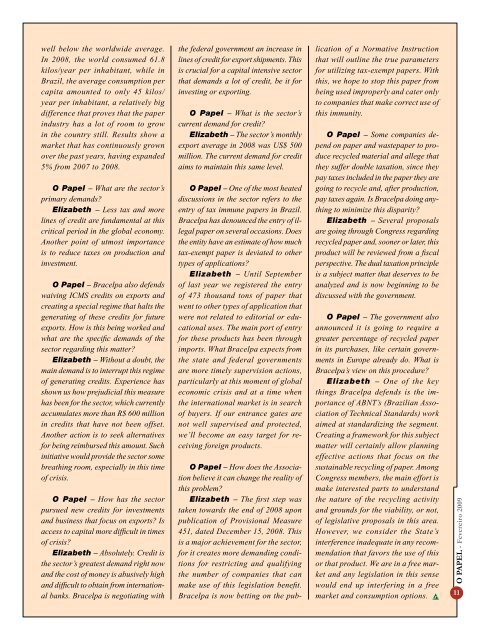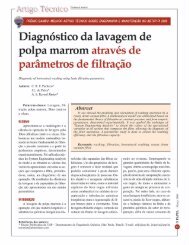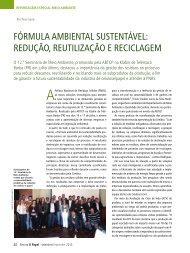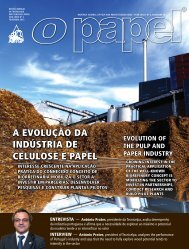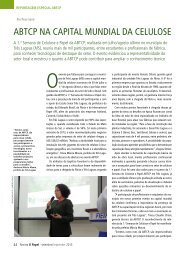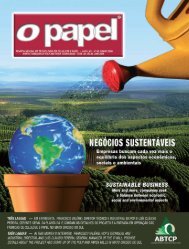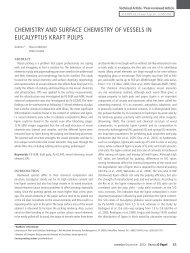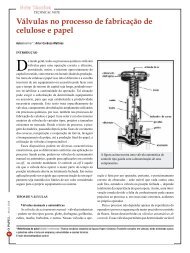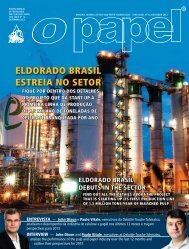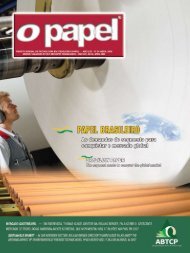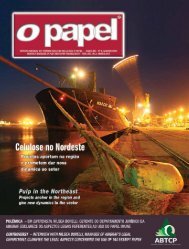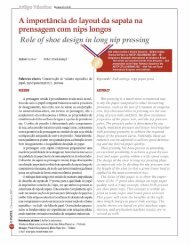Nova publicação - Revista O Papel
Nova publicação - Revista O Papel
Nova publicação - Revista O Papel
Create successful ePaper yourself
Turn your PDF publications into a flip-book with our unique Google optimized e-Paper software.
well below the worldwide average.<br />
In 2008, the world consumed 61.8<br />
kilos/year per inhabitant, while in<br />
Brazil, the average consumption per<br />
capita amounted to only 45 kilos/<br />
year per inhabitant, a relatively big<br />
difference that proves that the paper<br />
industry has a lot of room to grow<br />
in the country still. Results show a<br />
market that has continuously grown<br />
over the past years, having expanded<br />
5% from 2007 to 2008.<br />
O <strong>Papel</strong> – What are the sector’s<br />
primary demands<br />
Elizabeth – Less tax and more<br />
lines of credit are fundamental at this<br />
critical period in the global economy.<br />
Another point of utmost importance<br />
is to reduce taxes on production and<br />
investment.<br />
O <strong>Papel</strong> – Bracelpa also defends<br />
waiving ICMS credits on exports and<br />
creating a special regime that halts the<br />
generating of these credits for future<br />
exports. How is this being worked and<br />
what are the specific demands of the<br />
sector regarding this matter<br />
Elizabeth – Without a doubt, the<br />
main demand is to interrupt this regime<br />
of generating credits. Experience has<br />
shown us how prejudicial this measure<br />
has been for the sector, which currently<br />
accumulates more than R$ 600 million<br />
in credits that have not been offset.<br />
Another action is to seek alternatives<br />
for being reimbursed this amount. Such<br />
initiative would provide the sector some<br />
breathing room, especially in this time<br />
of crisis.<br />
O <strong>Papel</strong> – How has the sector<br />
pursued new credits for investments<br />
and business that focus on exports Is<br />
access to capital more difficult in times<br />
of crisis<br />
Elizabeth – Absolutely. Credit is<br />
the sector’s greatest demand right now<br />
and the cost of money is abusively high<br />
and difficult to obtain from international<br />
banks. Bracelpa is negotiating with<br />
the federal government an increase in<br />
lines of credit for export shipments. This<br />
is crucial for a capital intensive sector<br />
that demands a lot of credit, be it for<br />
investing or exporting.<br />
O <strong>Papel</strong> – What is the sector’s<br />
current demand for credit<br />
Elizabeth – The sector’s monthly<br />
export average in 2008 was US$ 500<br />
million. The current demand for credit<br />
aims to maintain this same level.<br />
O <strong>Papel</strong> – One of the most heated<br />
discussions in the sector refers to the<br />
entry of tax immune papers in Brazil.<br />
Bracelpa has denounced the entry of illegal<br />
paper on several occasions. Does<br />
the entity have an estimate of how much<br />
tax-exempt paper is deviated to other<br />
types of applications<br />
Elizabeth – Until September<br />
of last year we registered the entry<br />
of 473 thousand tons of paper that<br />
went to other types of application that<br />
were not related to editorial or educational<br />
uses. The main port of entry<br />
for these products has been through<br />
imports. What Bracelpa expects from<br />
the state and federal governments<br />
are more timely supervision actions,<br />
particularly at this moment of global<br />
economic crisis and at a time when<br />
the international market is in search<br />
of buyers. If our entrance gates are<br />
not well supervised and protected,<br />
we’ll become an easy target for receiving<br />
foreign products.<br />
O <strong>Papel</strong> – How does the Association<br />
believe it can change the reality of<br />
this problem<br />
Elizabeth – The first step was<br />
taken towards the end of 2008 upon<br />
publication of Provisional Measure<br />
451, dated December 15, 2008. This<br />
is a major achievement for the sector,<br />
for it creates more demanding conditions<br />
for restricting and qualifying<br />
the number of companies that can<br />
make use of this legislation benefit.<br />
Bracelpa is now betting on the publication<br />
of a Normative Instruction<br />
that will outline the true parameters<br />
for utilizing tax-exempt papers. With<br />
this, we hope to stop this paper from<br />
being used improperly and cater only<br />
to companies that make correct use of<br />
this immunity.<br />
O <strong>Papel</strong> – Some companies depend<br />
on paper and wastepaper to produce<br />
recycled material and allege that<br />
they suffer double taxation, since they<br />
pay taxes included in the paper they are<br />
going to recycle and, after production,<br />
pay taxes again. Is Bracelpa doing anything<br />
to minimize this disparity<br />
Elizabeth – Several proposals<br />
are going through Congress regarding<br />
recycled paper and, sooner or later, this<br />
product will be reviewed from a fiscal<br />
perspective. The dual taxation principle<br />
is a subject matter that deserves to be<br />
analyzed and is now beginning to be<br />
discussed with the government.<br />
O <strong>Papel</strong> – The government also<br />
announced it is going to require a<br />
greater percentage of recycled paper<br />
in its purchases, like certain governments<br />
in Europe already do. What is<br />
Bracelpa’s view on this procedure<br />
Elizabeth – One of the key<br />
things Bracelpa defends is the importance<br />
of ABNT’s (Brazilian Association<br />
of Technical Standards) work<br />
aimed at standardizing the segment.<br />
Creating a framework for this subject<br />
matter will certainly allow planning<br />
effective actions that focus on the<br />
sustainable recycling of paper. Among<br />
Congress members, the main effort is<br />
make interested parts to understand<br />
the nature of the recycling activity<br />
and grounds for the viability, or not,<br />
of legislative proposals in this area.<br />
However, we consider the State’s<br />
interference inadequate in any recommendation<br />
that favors the use of this<br />
or that product. We are in a free market<br />
and any legislation in this sense<br />
would end up interfering in a free<br />
market and consumption options.<br />
O PAPEL - Fevereiro 2009<br />
11


